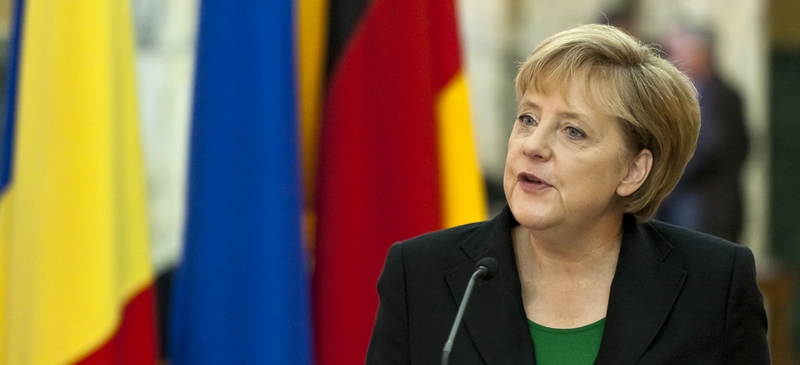
Can Angela Merkel talk Cameron into being a more flexible ally?
The vexed EU budget is supposed to be the main topic of discussion when Germany's chancellor, Angela Merkel, meets David Cameron for supper on Wednesday in Downing Street. But this meeting is really about much more: the future shape of Europe and the UK's place in it. Alas, neither Cameron nor Merkel have a coherent plan.
The press likes to portray prudent Britain as engaged in a solitary battle against wasteful Brussels bureaucrats, spoilt French farmers and needy Eastern Europeans. But Britain is not alone: Germany, the Netherlands, Austria, Finland, Sweden, even Italy have all been calling for a freeze in EU spending. The difference is that these countries understand the need for a compromise as the rest of the EU (the "net recipients" of EU money) would prefer a bigger budget.
In the past, Germany often used to lubricate compromise by throwing in an additional billion here or there. Today, Germany – feeling already overstretched by euro rescue efforts – is in no mood to spend more. So Merkel wants to reduce the European commission's planned budget framework by about €100-130bn. Cameron wants it cut by €200-250bn. The difference in their positions – stretched over the seven-year period over which EU budgets run – is too small to warrant a political showdown.
However, Merkel is seriously worried that Cameron will employ his veto at the EU summit on 22 November to placate his party colleagues at home. Since the Commons revolt last week, Cameron seems has little choice on this. The Germans fear the wider impact of a botched summit: "If we fail to reach an agreement [on the budget], if we cannot even sort out our routine business, it will be a bad signal for the December summit [where bigger issues, such as banking union and help for Spain are at stake]", a Merkel adviser told me a few weeks back in Berlin.
Merkel is also worried that with every new veto Cameron is backing himself into a corner from which there is ultimately only one escape: EU exit. Now that Labour has discovered the EU veto as a domestic political tool, this danger seems even more acute.
The Germans want Britain to stay in the union. They need a large, liberal-minded ally lest the EU becomes dominated by Gallic ideas about industrial policy and trade protectionism. But Berlin is becoming exasperated with British tactics, in particular when Cameron holds up EU treaty changes needed to underpin the euro, in an attempt to cajole other Europeans to "return powers" to Britain. Another Merkel adviser warned: "It is one thing if the UK is engaged in negotiations on a particular issue and makes demands on this issue in line with its national interest. It is quite another if the UK makes unrelated demands in negotiations on a euro issue."
Most German politicians have some sympathy for the political constraints under which Cameron is conducting his European business. Many are upset when British politicians in turn call on Merkel to ride roughshod over German public opinion and parliamentary majorities and move straight to eurobonds and Europe-wide guarantees for banks.
Merkel also knows that the British-German relationship is key for the future shape of a multispeed Europe. To save the euro, the countries that share the single currency will have to move closer together. They have to build a fiscal union, a banking union and the democratic oversight that these require.
No one in Berlin expects, or wants, Britain to be fully part of this. But other EU countries who are not in the euro, such as Sweden and Poland, fear that in a two-tier Europe they will be marginalised and powerless. They insist on having at least one foot in the new structures.
An obstinate British position will make it much harder for Germany to smooth the boundaries between the euro ins and the euro outs. It will also weaken Cameron's ability to fight for the City when the eurozone banking union is constructed. Merkel will therefore plead with Cameron to show some flexibility and vision. Will he just answer, "nein"?
